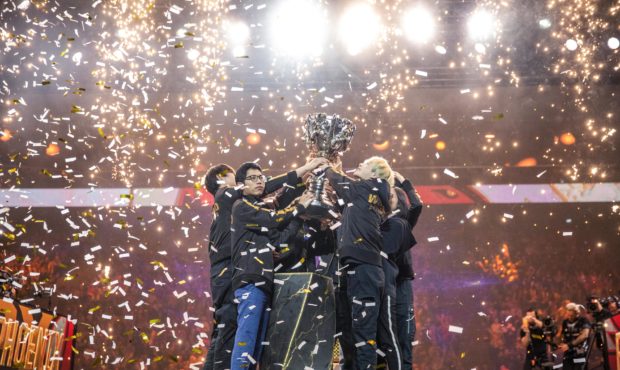They train 14 hours a day, 7 days a week, chasing million-dollar paydays. Meet China’s new breed of esports athletes
Dec 31, 2019, 6:34 AM

FunPlus Phoenix lift the League of Legends Summoner's Cup following victory in the 2019 LoL World Campionships in France Colin Young-Wolff/Riot Games Inc. via Getty Images
(CNN) — In the basement of a huge townhouse on the outskirts of Beijing, young Chinese men are clustered in front of screens playing computer games 14 hours a day.
But they’re not friends with too much time on their hands, or just eager gamers — they’re a new brand of professional athletes, and they’re training for serious money.
Esports is big business in China. According to state media, the country’s rapidly growing esports industry is now worth more than 100 billion yuan ($14 billion).
Gaming teams full of dedicated young people are training intensely across the country for international competitions, where millions of dollars in prize money is up for grabs.
In many ways, it’s just like any other sporting competition. Except instead of kicking balls or waving bats, these athletes are throwing virtual fireballs and taking down pixelated terrorists.
In 2018, China’s Invictus Gaming team won the world championship for the game “League of Legends” for the first time, beating European and US rivals to take home a large chunk of the $5 million prize pool.
Esports team RNG’s Beijing manager Bi Lianli told CNN Business that she believes China is rising to become a world leader in professional gaming.
“Last year, China were the champions in the world competition of League of Legends. Last May, our team won the championship in the preseason. It’s an undeniable fact that China now plays a leading role in the world of esports,” she said.
Esports revolution
Professional video game competitions have been around for more than a decade.
Generally, teams of players face off against each another in a digital showdown, and each game requires different skills. In popular pro-gaming standard “Counter Strike: Global Offensive,” players try to shoot the other team dead as quickly as possible, while in “League of Legends” they quietly build up their strength to invade the enemy base.
Competitions began as niche events for gamers to test their skills against each other. But, buoyed in part by the growing popularity of watching gamers playing live on YouTube and livestreaming platform Twitch, esports have rapidly become more popular — and lucrative.
According to market research firm Newzoo, global revenue from esports was expected to jump 26% year-on-year to $1.1 billion in 2019 and $1.8 billion by 2022.
There has even been a push for it to become an Olympic event. There won’t be an esports medal at the 2020 Olympics but there will be a tournament held in Tokyo in July just before next year’s Games begin.
Worldwide, there are an estimated 198 million esports fans, of whom about 75 million are in China — the largest concentration of fans globally, Newzoo said.
More young people in China are dreaming of becoming professional esports athletes. But only a small number will become truly elite.
14 hours a day, seven days a week
At the townhouse which serves as the Beijing headquarters for RNG (Royal Never Give Up), the athletes are hard at work preparing for the upcoming 2019 League of Legends World Championships.
In the enormous basement where the team practices, high-end gaming equipment is laid out in rows like office workstations, each littered with personal mementos like plush toys, awards or photos of loved ones.
When exercising or eating lunch, the RNG gamers are just like any other young men — smiling and cracking jokes with each other. When they sit down at their computers however, they instantly become grim-faced and serious.
Beijing manager Bi lays out their grueling daily schedule. They practice for 14 hours a day, seven days a week. They wake at 1 p.m. and fit in an hour’s solo practice before joining a team battle until 5 p.m.
“Then dinner. Then they go for a walk. They need exercise. Then they take a shower. They start to practice again at 7 p.m., then another round of battling with other teams until 11 p.m. Finally they can practice on their own until 4 a.m. when they go to sleep,” she said.
When asked why they practice so late at night, Bi said that’s how all the pro-gamers train. “Everyone’s resting and working routine is like this,” she said.
There is an on-site doctor and physiotherapist keeping a close eye on the gamers’ health, taking them out for at least one walk a day for exercise. This routine continues for three months straight ahead of the major competition season in the second half of the year.
It’s a strict schedule and Bi said that not everyone is cut out for it.
At the team’s trainee school in Shanghai, hundreds of eager teenagers sign up to be tested for admission. But barely anyone makes it through.
“Our goal is to win. Not to have fun. Everyone wants to win. There’s peer pressure as well. That’s the reason why out of the 100 people we enrolled in our teenage training center, almost zero can pass. Because the process is so hard,” she said.
For those who make the cut, the rewards can be substantial.
Bi wouldn’t reveal the salaries of her team but she said it wasn’t unusual for some players to be paid six-figure sums of yuan annually, in addition to any winnings.
Even more so than other professional sports, players also start young and retire early in esports. Bi said that most of China’s esports athletes were younger than 22, and the stressful and demanding lifestyle led many to retire by the age of 24. “Generally a 24-year-old is considered too old to be an (esports) athlete,” she said.
Things can also change quickly. As computer games fall in and out of fashion, gamers who excelled at particular titles can see their careers vanish overnight.
“We tried to make other athletes who were good at other games play the new games, to transform. But we found they couldn’t transform. They failed … It is very cruel,” Bi said.
‘You will be replaced’
At the age of 23, former professional esports athlete Yan Junze has already retired.
He started his pro-gaming career as a teenager in 2014, and was quickly recruited by RNG. Even during his short career, Yan said attitudes toward professional gaming had changed dramatically.
“Pro-gaming wasn’t as developed as well as what it is today. People were suspicious about it … esports players always played without telling their families,” he said.
“Nowadays, many young people would like to try it and their parents support them.”
Yan won’t say why he chose to retire, saying it was a “personal choice,” but he is still part of the community, commentating on esports matches. He is also working on becoming a fashion designer.
When asked about his former occupation, Yan is divided. There’s still a lot of positive things about being an esports athlete, he said. “It provides you an opportunity to chase your dreams,” he added.
But he said he still has physical injuries from the intensive training he underwent as a player, with others also suffering head and neck damage.
“It’s not as good as other people think. If you’re not famous, you will be lost. And you won’t know what to do. You can choose another career then, but with a lot of physical damage to your body,” he said.
Yan said that if pro-gamers aren’t famous when they stop competing, they won’t get lucrative opportunities such as commentating on games. “They will be forgotten. If you were not famous, or you didn’t have any achievements, you will be replaced,” he said.
The-CNN-Wire
™ & © 2019 Cable News Network, Inc., a WarnerMedia Company. All rights reserved.













